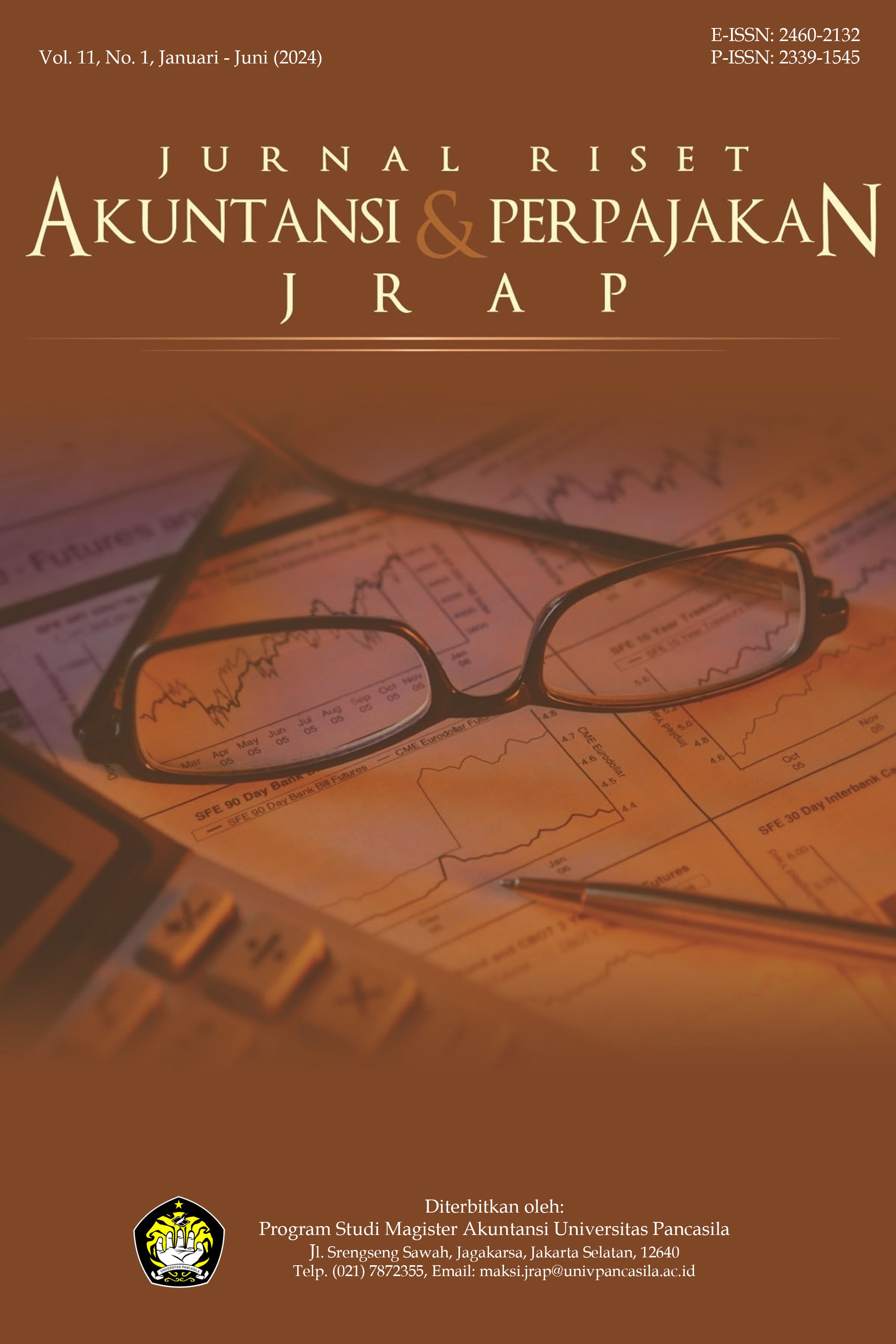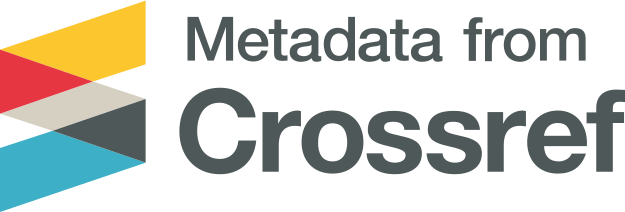Pengetahuan dan Sikap Keuangan: Perspektif Manajemen Keuangan dan Financial Self-Eficacy di Lingkungan Desa
Abstract views: 321 | Download Pdf downloads: 349
Abstract
This research was conducted to determine the factors that influence the Financial Management Behavior of Women Empowering Family Welfare in Sukomulyo Village. This research aims to analyze the influence of Financial Knowledge and Financial Attitude variables on Financial Management Behavior with Financial Self-efficacy as a mediating variable among Mothers who are Family Welfare Empowerment (PKK) Administrators in Sukomulyo Village, Manyar District, Gresik Regency. The type of research used is quantitative with data analysis techniques using PLS (Partial Least Square) analysis with the SmartPLS program. The population and sample used in this research were the Family Welfare Empowerment (PKK) administrators at the Sukomulyo Village Community Association, totaling 135 respondents. The research results show that Financial Knowledge and Financial Attitudes have a positive effect on Financial Management Behavior. Apart from that, both also have a positive effect on Financial Self-efficacy, which in turn also influences Financial Management Behavior. Financial Self-efficacy also functions as a mediating variable, which connects Financial Knowledge and Financial Attitudes with Financial Management Behavior. These findings emphasize the importance of having good Financial Knowledge, a positive Financial Attitude, and strong Financial Self-efficacy in forming wise financial management behavior among mothers in the village.
References
Afdilla, U. B. (2016). Pengaruh Pengetahuan Keuangan, Sikap Keuangan Dan Kepribadian Terhadap Perilaku Manajeman Keuangan Pada Pelaku Umkm Penghasil Susu Di Pujon (Studi Kasus Pada Koperasi Susu Sae Pujon) Oleh. E – Jurnal Riset Manajemen, 82–94.
Ajzen, I. (1991). The Theory Of Planned Behavior. Disability, Cbr And Inclusive Development.
Ali, M., Qamar, J., Asif, M., Khemta, N., & Jamil, H. (2016). How Knowledge And Financial Self-Efficacy Moderate The Relationship Between Money Attitudes And Personal Financial Management Behavior. European Online Journal Of Natural And Social Sciences, 296–308.
Amagir, A., Groot, W., Van Den Brink, H. M., & Wilschut, A. (2020). Financial Literacy Of High School Students In The Netherlands: Knowledge, Attitudes, Self-Efficacy, And Behavior. International Review Of Economics Education, 34, 100185. https://doi.org/10.1016/J.Iree.2020.100185
Ameliawati, M., & Setiyani, R. (2018). The Influence Of Financial Attitude, Financial Socialization, And Financial Experience To Financial Management Behavior With Financial Literacy As The Mediation Variable. International Conference On Economics, Business And Economic Education, 811–832.
Andrew, V., & Nanik, L. (2014). Hubungan Faktor Demografi Dan Pengetahuan Keuangan Dengan Perilaku Keuangan Karyawan Swasta Di Surabaya. 2.
Arofah, A. A., & Kurniawati, R. (2021). Pengaruh Literasi Keuangan Dan Self-Efficacy Terhadap Perilaku Keuangan. 1.
Asandimitra, N., & Kautsar, A. (2019). The Influence Of Financial Information, Financial Self Efficacy, And Emotional Intelligence To Financial Management Behavior Of Female Lecturer. Humanities And Social Sciences Reviews, 7(6), 1112–1124. https://doi.org/10.18510/Hssr.2019.76160
Asmin, E. A., Ali, M., Nohong, M., & Mardiana, R. (2021). The Effect Of Financial Self-Efficacy And Financial Knowledge On Financial Management Behavior. 1.
Assyfa, L. N. (2020). Pengaruh Uang Saku, Gender Dan Kemampuan Akademik Terhadap Perilaku Pengelolaan Keuangan Pribadi Mahasiswa Akuntansi Dengan Literasi Keuangan Sebagai Variabel Intervening. Prisma (Platform Riset Mahasiswa Akuntansi), 1, 109–119.
Atikah, A., & Kurniawan, R. R. (2021). Pengaruh Literasi Keuangan, Locus Of Control, Dan Financial Self Efficacy Terhadap Perilaku Manajemen Keuangan. JMB : Jurnal Manajemen Dan Bisnis, 10(2), 284–297. https://doi.org/10.31000/Jmb.V10i2.5132
Ayuni, N. M. S., & Lestari, N. K. D. S. (2022). Pengaruh Financial Knowledge Dan Income Melalui Locus Of Control Terhadap Financial Management Behavior. E-Jurnal Ekonomi Dan Bisnis Universitas Udayana, 11(09), 1141–1151.
Bandura, A. (1977). Self-Efficacy: Toward A Unifying Theory Of Behavioral Chance. Psychological Review. Departement Of Psycology, Standford University.
Baptista, S. M. J. (2021). The Influence Of Financial Attitude, Financial Literacy, And Locus Of Control On Financial Management Behavior (Study Case Working-Age Of Semarang). International Journal Of Social Science And Business, 5(1), 93–98. https://doi.org/10.23887/Ijssb.V5i1.31407
Brandon, D. ., & Smith, C. . (2009). Prospective Teachers Financial Knowledge Ang Teaching Self Efficacy. Journal Of Family & Consumer Sciences Education., 27, 14–28.
Cahya, A. D., Amrina, H. N., & Oktaviyani, S. (2021). Pengaruh Sikap Keuangan Terhadap Perilaku Manajemen Keuangan Pada Umkm Batik Jumputan. E-Bisnis : Jurnal Ilmiah Ekonomi Dan Bisnis, 14(2), 22–29. https://doi.org/10.51903/E-Bisnis.V14i2.413
Chaer, M. T. (2016). Self-Efficacy Dan Pendidikan (Kajian Teori Kognitif Sosial Dan Implikasinya Dalam Pendidikan Agama Islam). Jurnal Studi Kependidikan Dan Keislaman, 3.
Christian, S., & Wiyanto, H. (2020). Pengaruh Sikap Keuangan, Sosial, Dan Pengetahuan Keuangan Terhadap Perencanaan Keuangan Pribadi. Jurnal Manajerial Dan Kewirausahaan, 2(3), 820. https://doi.org/10.24912/Jmk.V2i3.9596
Dewi, I. A. K., & Rochmawati, R. (2020). Pengaruh Money Attitude Terhadap Perilaku Pengelolaan Keuangan Pribadi: Pengetahuan Dan Financial Self-Efficacy Sebagai Moderasi. Jurnal Pendidikan Ilmu Sosial, 30(2), 123–134. https://doi.org/10.23917/Jpis.V30i2.10956
Djou, L. D. G. (2019). Analisis Pengaruh Literasi Keuangan, Sikap Keuangan Dan Kepribadian Terhadap Perilaku Pengelolaan Keuangan Umkm Di Kabupaten Ende. Magisma: Jurnal Ilmiah Ekonomi Dan Bisnis, 7(2), 123-134.
Estuti, E. P., Rosyada, I., & Faidah, F. (2021). Analisis Pengetahuan Keuangan, Kepribadian Dan Sikap Keuangan Terhadap Perilaku Manajemen Keuangan. 4.
Febriani, N. ., & Dewi, W. W. (2017). Teori Dan Praktis : Riset Komunikasi Pemasaran Terpadu. Ub Press.
Gahagho, Y. D., Rotinsulu, T. O., & Mandeij, D. (2021). Pengaruh Literasi Keuangan Sikap Keuangan Dan Sumber Pendapatan Terhadap Perilaku Pengelolaan Keuangan Mahasiswa Fakultas Ekonomi Dan Bisnis Unsrat Dengan Niat Sebagai Variabel Intervening. Jurnal Emba: Jurnal Riset Ekonomi, Manajemen, Bisnis Dan Akuntansi, 9(1), 543–555.
Ghozali, I. (2014). Structural Equation Modeling Metode Alternatif Dengan Partial Least Square (Pls). Badan Penerbit – Undip.
Ghozali, I., & Latan, H. (2020). Partial Least Squares: Konsep, Teknik, Dan Aplikasi Menggunakan Program Smartpls 3.0 (2nd Ed.). Badan Penerbit – Undip.
Hussein, A. . (2015). Penelitian Bisnis Dan Manajemen Menggunakan Partial Least Square (Pls) Dengan Smartpls 3.0.
Jatmiko, A. (2015). Analisis Strategi Pemasaran Produk Tabungan Ib Tapenas Hasanah Pada Bank Bni Syariah Semarang.
Khodijah, I., Afriani, R. I., Yuliah, Y., & Octavitri, Y. (2021). Pengaruh Literasi Keuangan Dan Sikap Keuangan Terhadap Perilaku Pengelolaan Keuangan Keluarga Di Masa Pandemi Covid-19 Dengan Self Efficacy Sebagai Variabel Intervening. National Conference On Applied Business, Education, & Technology (Ncabet), 1(1), 630–644. https://doi.org/10.46306/Ncabet.V1i1.51
Kompas. (2015). Ojk: Orang Indonesia Makin Konsumtif. https://money.kompas.com/Read/2015/08/08/110746226/Ojk.Orang.Indonesia.Makin.Konsumtif?Lgn_Method=Google
Lianto, R., & Elizabeth, S. M. (2017). Analisis Pengaruh Financial Attitude, Financial Knowledge, Dan Income Terhadap Financial Behavior Di Kalangan Ibu Rumah Tangga Palembang (Studi Kasus Kecamatan Ilir Timur I). Jurnal Manajemen Stie Mdp.
Lukesi, E., Rahadjeng, E. R., & Satiti, N. R. (2021). Effect Of Financial Attitudes, Financial Knowledge, Locus Of Control, And Financial Self-Efficacy To Financial Management Behavior In Millennial Generation. Jamanika (Jurnal Manajemen Bisnis Dan Kewirausahaan), 56–63.
Maghfirah, N., Hartaty, H., & Muhsin, B. (2022). Pengaruh Pengetahuan Keuangan Terhadap Perilaku Manajemen Keuangan Dengan Pengendalian Diri Sebagai Variabel Moderasi. Jurnal Ekonomi Dan Bisnis, 10(1), 298–305.
Mahyarni. (2013). Theory Of Reasoned Action Dan Theory Of Planned Behavior (Sebuah Kajian Historis Tentang Perilaku). 4. https://doi.org/10.24014/Jel.V4i1.17
Mardiana, M., & Widoatmojo, S. (2023). Factors Affecting Financial Management Behavior Among Universitas Tarumanagara’s Students. International Journal Of Application On Economics And Business, 1(1), 354–362. https://doi.org/10.24912/Ijaeb.V1i1.354-362
Martinez, L. V., & Andal, E. Z. (2022). Relations Of Financial Literacy And Decision-Making Skills To Teacher’s Financial Well-Being And Professional Qualities. International Journal Of Accounting, Finance And Entrepreneurship, 1(1). https://doi.org/10.53378/352871
Mien, N., & Thao, T. (2015). Factors Affecting Personal Financial Management Behaviors: Evidence From Vietnam.
Mindra, R., & Moya, M. B. (2017). Financial Self-Efficacy: A Mediator In Advancing Financial Inclusion. Equality Diversity And Inclusion An International Journal 36. https://doi.org/10.1108/Edi-05-2016-0040
Mulyati, S., & Hati, R. P. (2021). Pengaruh Literasi Keuangan Dan Sikap Terhadap Uang Pada Pengelolaan Keuangan Keluarga The Effect Of Financial Literation And Attitude To Money On Family Financial Management. Jurnal Ilmiah Akuntansi Dan Finansial Indonesia, 4, 33–48.
Napitupulu, J. H., Ellyawati, N., & Astuti, R. F. (2021). Pengaruh Literasi Keuangan Dan Sikap Keuangan Terhadap Perilaku Pengelolaan Keuangan Mahasiswa Kota Samarinda. Jurnal Pendidikan Ekonomi (Jupe), 9(3), 138–144. https://doi.org/10.26740/Jupe.V9n3.P138-144
Nisa, F. K., & Asandimitra, N. (2022). Pengaruh Financial Knowledge, Financial Attitude, Financial Self Efficacy, Income, Locus Of Control, Dan Lifestyle Terhadap Financial Management Behavior Generasi Z Di Kota Surabaya. Jurnal Ilmu Manajemen, 10(1), 82–97. https://doi.org/10.26740/Jim.V10n1.P82-97
Novianti, M., & Salam, A. (2021). Pengaruh Pengetahuan Keuangan, Sikap Keuangan Dan Kepribadian Terhadap Perilaku Manajemen Keuangan Pelaku Umkm Di Moyo Hilir. Jurnal Manajemen Dan Bisnis, 4(3), 18–26.
Parrotta, J. L., & Johnson, P. J. (1998). The Impact Of Financial Attitudes And Knowledge On Financial Management And Satisfaction Of Recently Married Individuals. Financial Counseling And Planning, 59–74.
Pebriyanti, A., & Sugianto, D. B. P. (2020). Analisis Perilaku Manajemen Keuangan Pada Ibu Rumah Tangga Desa Cisaat, Waled Cirebon. Business Management, Economic, And Accounting National Seminar, 1(1), 367–382.
Perry, V. G., & Morris, M. D. (2005). Who Is In Control? The Role Of Self-Perception, Knowledge, And Income In Explaining Consumer Financial Behavior. The Journal Of Consumer Affairs.
Pradinaningsih, N. A., & Wafiroh, N. L. (2022). Pengaruh Literasi Keuangan, Sikap Keuangan Dan Self-Efficacy Terhadap Pengelolaan Keuangan Ibu Rumah Tangga. E-Jurnal Akuntansi, 32(6), 1518. https://doi.org/10.24843/Eja.2022.V32.I06.P10
Pradesa, H. A., Agustina, I., Sulistyan, R. B., & Rusdianti, I. S. (2023). Studi Empiris Tentang Kompetensi Auditor Dalam Melakukan Fungsi Audit Internal Pada Bank Pembiayaan Rakyat Syariah. JRAP (Jurnal Riset Akuntansi Dan Perpajakan), 10(1), 81-91. https://doi.org/10.35838/jrap.2023.010.01.08
Pradiningtyas, T. E., & Lukiastuti, F. (2019). Pengaruh Pengetahuan Keuangan Dan Sikap Keuangan Terhadap Locus Of Control Dan Perilaku Pengelolaan Keuangan Mahasiswa Ekonomi. Jurnal Minds: Manajemen Ide Dan Inspirasi, 6(1), 96. https://doi.org/10.24252/Minds.V6i1.9274
Pramedi, A. D., & Asandimitra, N. (2021). Pengaruh Financial Literacy, Financial Knowledge, Financial Attitude, Income Dan Financial Self Efficacy Terhadap Financial Management Behavior Entrepreneur Lulusan Perguruan Tinggi Di Surabaya. Jurnal Ilmu Manajemen, 9(2), 572. https://doi.org/10.26740/Jim.V9n2.P572-586
Prihartono, M. R. D., & Asandimitra, N. (2018). Analysis Factors Influencing Financial Management Behaviour. International Journal Of Academic Research In Business And Social Sciences, 8, 308–326.
Putri, M. H., & Pamungkas, A. S. (2019). Pengaruh Financial Knowledge, Locus Of Control Dan Financial Self Efficacy Terhadap Financial Behavior. Jurnal Manajerial Dan Kewirausahaan, 1(4), 926. https://doi.org/10.24912/Jmk.V1i4.6591
Putri, R. S., Tubastuvi, N., Rahmawati, I. Y., & Endratno, H. (2023). The Effect Of Financial Literacy , Financial Knowledge , Financial Attitudes And Personality On Financial Management Behavior In Msme.
Rahman, A., Yousida, I., Kristansi, L., & Paujiah, S. (2020). Pengaruh Pengetahuan Keuangan, Perencanaan Keuangan Dan Kontrol Diri Terhadap Perilaku Pengelolaan Keuangan Pada Mahasiswa Yang Menjalankan Praktik Bisnis Dikota Banjarmasin. Jurnal Mitra Manajemen, 4(9), 1405–1416. https://doi.org/10.52160/Ejmm.V4i9.466
Rizkiawati, N. L., & Asandimitra, N. (2018). The Influence Of Demography, Financial Knowledge, Financial Attitude, Locus Of Control And Financial Self-Efficacy On The Financial Management Behavior Of The Surabaya Community. Jurnal Ilmu Manajemen (Jim), 6(3), 93–107.
Rohmah, N., Susbiyani, A., Aspirandy, R. M., & Cahyono, D. (2021). Pengaruh Financial Knowledge, Financial Attitude Dan Internal Locus Of Control Terhadap Perilaku Manajemen Keuangan. Jurnal Ekobis : Ekonomi Bisnis & Manajemen, 11(1), 150–161. https://doi.org/10.37932/J.E.V11i1.249
Rustiaria, A. P. (2017). Pengaruh Pengetahuan Keuangan, Sikap Keuangan, Dan Tingkat Pendidikan Terhadap Perilaku Pengelolaan Keuangan Keluarga. Journal Of Business And Banking.
Sabri, M. F., Wijekoon, R., Rahim, H. A., & Ahmad, N. (2022). Financial Literacy , Financial Behavior , Self-Efficacy , And Financial Health Among Malaysian Households : The Mediating Role Of Money Attitudes. June. https://doi.org/10.6007/Ijarbss/V12-I13/14150
Safitri, E., Sriyunianti, F., & Chandra, N. (2023). Pengaruh Literasi Keuangan Dan Sikap Keuangan Terhadap Perilaku Pengelolaan Keuangan Umkm (Studi Kasus Pada Usaha Mikro Bidang Kerajinan. Jurnal Akuntansi, Bisnis, 2(1), 118–128.
Safitri, M., & Sari, R. C. (2021). The Effect Of Financial Knowledge And The Use Of E-Money Toward Financial Behavior Of Undergraduate Students Faculty Of Economics Yogyakarta State University. 10.
Sari, N. R., & Listiadi, A. (2021). Pengaruh Literasi Keuangan, Pendidikan Keuangan Di Keluarga, Uang Saku Terhadap Perilaku Pengelolaan Keuangan Dengan Financial Self-Efficacy Sebagai Variabel Intervening. Jurnal Pendidikan Akuntansi (JPAK), 9(1), 58–70. https://doi.org/10.26740/Jpak.V9n1.P58-70
Selcuk, E. A. (2015). Factors Influencing College Students’ Financial Behaviors In Turkey: Evidence From A National Survey. International Journal Of Economics And Finance. https://doi.org/10.5539/Ijef.V7n6p87
Setyawan, W., & Wulandari, S. (2020). Peran Sikap Keuangan Dalam Mengintervensi Pengaruh Literasi Keuangan Terhadap Perilaku Manajemen Keuangan Pekerja Di Cikarang. Jurnal Sekuritas (Saham, Ekonomi, Keuangan Dan Investasi), 4(1), 15. https://doi.org/10.32493/Skt.V4i1.6435
Silaen, S. (2018). Metodologi Penelitian Sosial Untuk Penulisan Skripsi Dan Tesis. In Media.
Sinambela, L. (2022). Metodologi Penelitian Kuantitatif : Teoretik Dan Praktik. Rajawali Pers.
Sugiharti, H., & Maula, K. A. (2019). Pengaruh Literasi Keuangan Terhadap Perilaku Pengelolaan Keuangan Mahasiswa. Accounthink : Journal Of Accounting And Finance, 4(2), 804–818. https://doi.org/10.35706/Acc.V4i2.2208
Sugiyono. (2020). Metode Penelitian Kuantitatif. Alfabeta.
Sukirno, S. (2012). Makroekonomi Teori Pengantar Edisi Ketiga. Rajawali Pers.
Susanti, A., Ismunawan, P., & Ardyan, E. (2017). Tingkat Pendidikan, Literasi Keuangan, Dan Perencanaan Keuangan Terhadap Perilaku Keuangan Umkm Di Surakarta. 45–56.
Sutanti, R. L. (2019). Pengaruh Pendapatan, Efikasi Diri Keuangan, Sikap Keuangan, Locus Of Control, Dan Pengetahuan Keuangan Terhadap Perilaku Manajemen Keuangan Masyarakat Kota Purwokerto.
Suwatno, S., Waspada, I. P., & Mulyani, H. (2020). Meningkatkan Perilaku Pengelolaan Keuangan Mahasiswa Melalui Financial Literacy Dan Financial Sel Efficacy. Jurnal Pendidikan Akuntansi & Keuangan, 8(1), 87–96. https://doi.org/10.17509/Jpak.V8i1.21938
Tampubolon, M., & Rahmadani, R. (2022). Pengaruh Pengetahuan Keuangan, Sikap Keuangan Dan Kepribadian Terhadap Perilaku Manajemen Keuangan Pada Pelaku Umkm Di Kecamatan Air Putih Kabupaten Batubara. Jurnal Akuntansi, Manajemen, Bisnis Dan Teknologi (Ambitek), 2(1), 70–79. https://doi.org/10.56870/Ambitek.V2i1.38
Topa, G., Hernández-Solís, M., & Zappalà, S. (2018). Financial Management Behavior Among Young Adults: The Role Of Need For Cognitive Closure In A Three-Wave Moderated Mediation Model. Frontiers In Psychology, 9, 1–10. https://doi.org/10.3389/Fpsyg.2018.02419
Ulumudiniati, M., & Asandimitra, N. (2022). Pengaruh Financial Literacy, Financial Self-Efficacy, Locus Of Control, Parental Income, Love Of Money Terhadap Financial Management Behavior: Lifestyle Sebagai Mediasi. Jurnal Ilmu Manajemen, 10(1), 51–67. https://doi.org/10.26740/Jim.V10n1.P51-67
Wasita, P. A. A., Artaningrum, R. G., & Clarissa, S. V. (2022). Pengaruh Literasi Keuangan Dan Sikap Keuangan Terhadap Perilaku Keuangan Dengan Self-Efficacy. Imat (Jurnal Ilmiah Mahasiswa Akuntansi), 13(1), 310–320.
Wening, P. M. (2022). Pengaruh Literasi Keuangan, Locus Of Control Dan Kepribadian Terhadap Perilaku Keuangan Melalui Financial Self-Efficacy Sebagai Variabel Intervening. Business And Accounting Education Journal, 3. https://doi.org/10.15294/Baej.V3i3.51930
Yamauchi, K. T., & Templer, D. I. (1982). The Development Of A Money Attitude Scale. Journal Of Personality Assessment. https://doi.org/10.1207/S15327752jpa4605_14
Yong, C. C., Yew, S. Y., & Wee, C. K. (2018). Financial Knowledge, Attitude And Behaviour Of Young Working Adults In Malaysia. Institutions And Economies, 10(4), 21–48.
Copyright (c) 2024 Ulfiatur Rosyidah, Rahmat Agus Santoso

This work is licensed under a Creative Commons Attribution-ShareAlike 4.0 International License.
Authors who publish with this journal agree to the following terms:
- Authors retain copyright and grant the journal right of first publication with the work simultaneously licensed under a Creative Commons Attribution-ShareAlike 4.0 International License that allows others to share the work with an acknowledgement of the works authorship and initial publication in this journal.
- Authors are able to enter into separate, additional contractual arrangements for the non-exclusive distribution of the journals published version of the work (e.g., post it to an institutional repository or publish it in a book), with an acknowledgement of its initial publication in this journal.
- Authors are permitted and encouraged to post their work online (e.g., in institutional repositories or on their website) prior to and during the submission process, as it can lead to productive exchanges, as well as earlier and greater citation of published work (See The Effect of Open Access).














